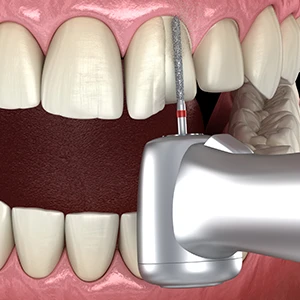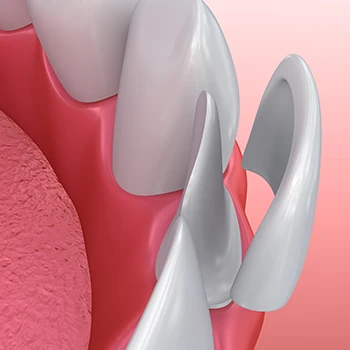Yes, veneers can turn yellow over time. Dental veneers, though designed to enhance the aesthetics of your smile, are not immune to discoloration. This blog will explore why veneers change color, the types of dental veneers available, and how you can maintain their brightness.
What are Dental Veneers and Their Types?
Dental veneers are thin shells, typically made of porcelain or composite resin, custom-designed to cover the front surface of teeth. They serve to improve the appearance of teeth affected by discoloration, chips, cracks, or gaps. There are two main types of dental veneers:
Porcelain Veneers:
Porcelain veneers are known for their durability and natural appearance. They are stain-resistant and can last for many years with proper care.
Composite Veneers:
Composite veneers are more affordable than porcelain and can be directly applied to the teeth in a single visit. However, they may not be as resistant to staining and may require more frequent maintenance.
Why Do Veneers Change Colors?
Several factors contribute to the yellowing of veneers over time:
Staining:
Just like natural teeth, veneers can become stained by certain foods and beverages. Coffee, tea, red wine, and highly pigmented foods can leave stains on the surface of veneers, causing them to appear yellow or discolored.
Poor Oral Hygiene:
Inadequate brushing and flossing can lead to the buildup of plaque and tartar around the veneers, which can contribute to discoloration. Maintaining good oral hygiene habits is crucial for preserving the appearance of veneers.
Tobacco Use:
Smoking or using tobacco products can significantly impact the color of veneers. Nicotine and tar found in tobacco can adhere to the surface of the veneers, causing them to become yellow or brown over time.
Wear and Tear:
Over time, the thin layer of material covering the teeth can wear down, exposing the underlying material, which may be more prone to staining. Additionally, small cracks or chips in the veneers can trap food particles and bacteria, leading to discoloration.
How Can I Whiten My Veneers?
While veneers cannot be whitened in the same way as natural teeth, there are still options to improve their color:
Professional Cleaning:
Regular visits to your dentist for professional cleanings can help remove surface stains and keep your veneers looking brighter. Your dentist may use specialized tools and solutions to gently clean the veneers without damaging them.
Whitening Toothpaste:
Using a non-abrasive whitening toothpaste specifically designed for veneers can help remove surface stains without causing damage to the veneers themselves. Look for toothpaste with mild abrasives and whitening agents to maintain the brightness of your veneers.
Avoid Staining Foods and Beverages:
Limiting consumption of foods and drinks known to stain teeth can prevent further discoloration of your veneers. If you do indulge in staining substances, rinse your mouth with water afterward to minimize their effects on your veneers.
Quit Smoking:
If you smoke, quitting can not only improve your overall oral health but also prevent further yellowing of your veneers. Talk to your dentist or healthcare provider for resources and support to help you quit smoking.
Consult Your Dentist:
If your veneers have significant discoloration that cannot be addressed with at-home methods, consult your dentist for professional whitening treatments, or possibly replace the veneers altogether for a brighter smile.
Care and Maintenance of Dental Veneers.
Proper care and maintenance are essential for preserving the appearance and longevity of your veneers:
Regular Brushing and Flossing:
Brush your teeth at least twice a day and floss daily to remove plaque and food particles from around your veneers. Pay special attention to the gum line and areas between the teeth where plaque can accumulate.
Use a Soft-Bristled Toothbrush:
Opt for a soft-bristled toothbrush to avoid damaging the veneers or causing gum irritation. Gentle brushing with a soft brush can effectively clean the veneers without scratching or wearing them down.
Avoid Abrasive Toothpaste:
Harsh or abrasive toothpaste can scratch the surface of veneers, making them more susceptible to staining. Choose a non-abrasive toothpaste recommended by your dentist to maintain the brightness of your veneers.
Wear a Mouthguard:
If you grind your teeth at night, wearing a mouthguard can protect your veneers from damage and premature wear. Talk to your dentist about custom-made mouthguards for optimal protection.
Regular Dental Checkups:
Schedule regular dental checkups to monitor the condition of your veneers and address any issues promptly. Your dentist can detect early signs of discoloration or damage and recommend appropriate treatment to maintain the appearance and functionality of your veneers.
Book a Consultation Today!
If you're considering dental veneers or need maintenance for your existing veneers, Dental 1 Care is here to help. Our experienced team of dentists specializes in cosmetic dentistry and can provide personalized treatment plans to enhance your smile. Book a consultation today to discuss your options and achieve the bright, beautiful smile you deserve.





